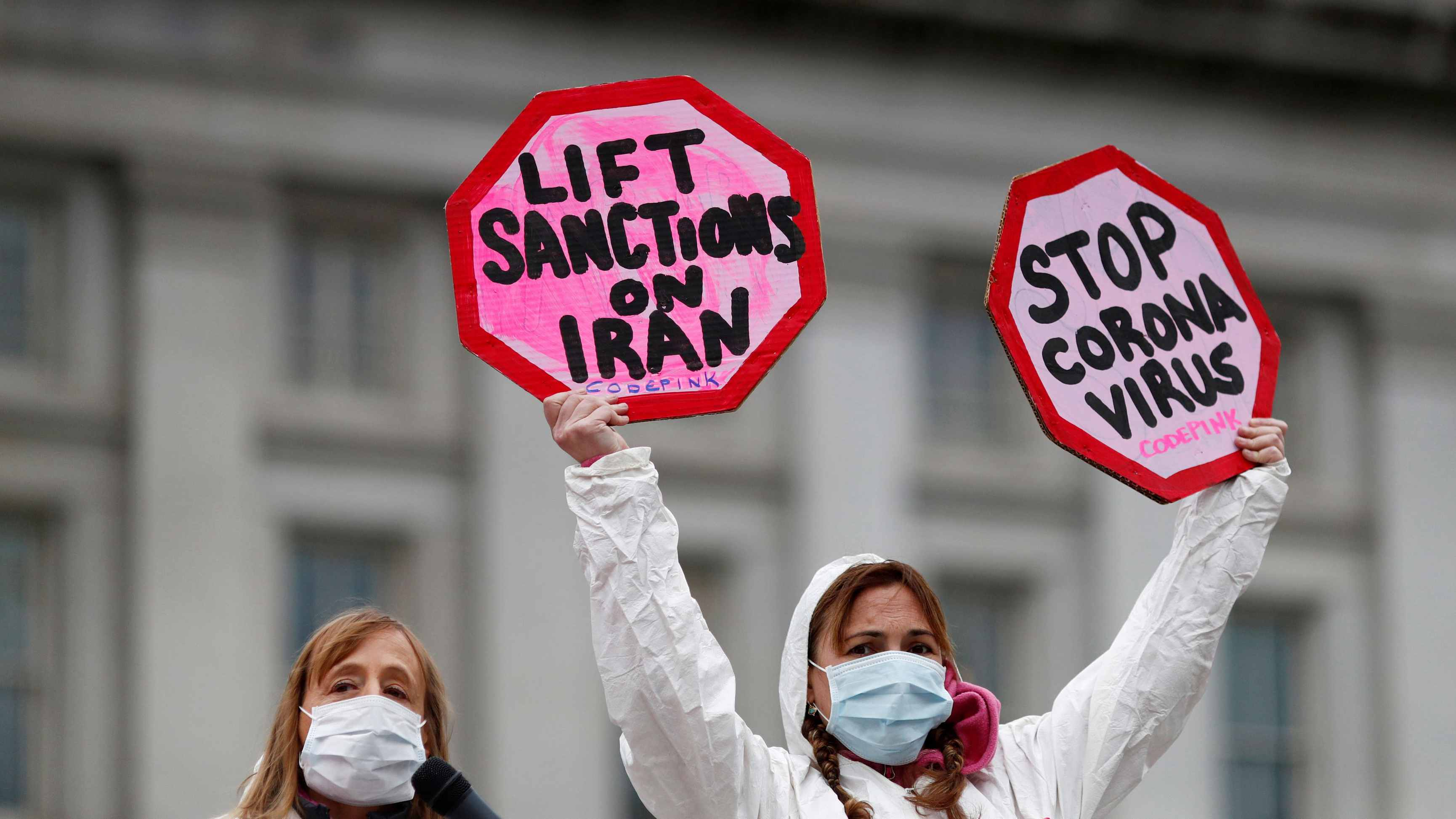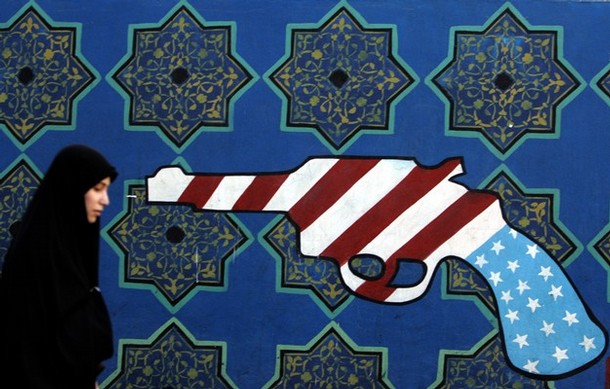
(Photo: CODEPINK)
Alexander Main / Al Jazeera English
US presidents should not have the power to unilaterally wage economic warfare against civilian populations.
WASHINGTON, DC (March 20, 2020) — Much ink has been spilled over the potentially disastrous consequences of President Donald Trump’s impulsive and foolhardy foreign policy decisions. Trump’s withdrawal from the Iran deal, his nuclear game of chicken with North Korea, the assassination of Iranian commander Qasem Soleimani, and other reckless moves imperiling millions of lives have been roundly criticized by scores of policymakers and editorial writers.
But one particularly brutal set of White House measures that has already caused tens of thousands of casualties abroad has been ignored by most of Trump’s critics. Since taking office, the president has unilaterally imposed a number of deadly, sweeping economic sanctions on Iran, North Korea, and Venezuela.
These sanctions have not, by any reasonable measure, advanced US foreign policy interests. They have, however, wreaked havoc and destruction in the lives of countless innocent human beings. And now they are fanning the deadly flames of the COVID-19 pandemic.
In Iran, Trump’s sanctions have severely limited the country’s access to medicines and medical supplies, thereby directly contributing to the high rate of COVID-19 infections and deaths there. Researchers in Tehran have drawn up chilling simulations that forecast as many as 3.5 million deaths. This hasn’t stopped the Trump administration from imposing new sanctions directed at Iran’s petrochemical industry, which provides a critical source of revenue to the country.
Venezuela may soon face an even more disastrous situation. Economic sanctions imposed by Trump in 2017, and then vastly expanded in 2019, have already resulted in increased disease and caused tens of thousands of excess deaths, according to a 2019 study by economists Mark Weisbrot and Jeffrey Sachs. In recent years, the country has been unable to cope with outbreaks of diphtheria, measles, and malaria; with most Venezuelan doctors reporting that they have no masks, gloves, or even soap, public health experts fear that the country is on the brink of a major catastrophe.
Trump’s Deadly Sanctions Power Should Be Reined In
The media has generally failed to inform the public about the harmful impact of Trump’s sanctions on innocent people in Iran, Venezuela, and other countries. Few of the many alarming reports on the economic and humanitarian situation in Venezuela, for instance, have mentioned the significant role of US sanctions in deepening the country’s severe economic crisis and preventing recovery. With COVID-19 now putting the spotlight on the extreme difficulties that sanctioned countries have in addressing public health emergencies, more media outlets are beginning to connect the dots between sanctions and human suffering.
Why hasn’t there been, until now, more tangible concern about the brutal “collateral damage” caused by Trump’s economic sanctions? One likely explanation is that the US foreign policy establishment has traditionally supported sanctions, despite studies showing that they generally don’t produce the desired political outcome.
As a Council on Foreign Relations backgrounder explains, “sanctions, while a form of intervention, are generally viewed as a lower-cost, lower-risk course of action between diplomacy and war. Policymakers may consider sanctions as a response to foreign crises in which the national interest is less than vital or where military action is not feasible.”
The negative human consequences of sanctions aren’t immediately apparent and, when reports on sanctions-linked deaths emerge ― as was the case in the early 1990s when economic sanctions were imposed on Haiti ― they are often ignored.
Fortunately, some US policymakers have begun bucking the cynical bipartisan consensus on sanctions and have been speaking out against their dire effects and lack of tangible results. In December 2018, 14 members of Congress sent a letter to the administration seeking “answers regarding the humanitarian impact that recently imposed US sanctions are having on the Iranian people.”
In March 2019, 16 members of the House signed a letter to Secretary of State Mike Pompeo opposing Trump’s economic sanctions against Venezuela and noting that they were having “lethal effects on innocent people” and “contributing to the ongoing outbound migration of hundreds of thousands of Venezuelans.”
Iran’s Coronavirus Risks Increased by US Sanctions
On March 18, Bernie Sanders noted that Iran faces “a catastrophic toll from the coronavirus pandemic” and called on the US government to “lift any sanctions hurting Iran’s ability to address this crisis, including financial sanctions.”
But the first to take decisive action to rein in the president’s unilateral use of sanctions is Congresswoman Ilhan Omar (D-MN), with a new bill entitled the Congressional Oversight over Sanctions Act (or COSA). Part of a bold, new package of legislation aimed at promoting peace, human rights, and respect for international law, COSA would amend the National Emergencies Act and the International Economic Emergency Powers Act, which ― together ― allow the president to order sanctions of all types without congressional approval, simply by invoking a “national emergency” (regardless of whether there is evidence of such a thing).
Omar’s bill establishes strict legislative control over the executive branch’s use of sanctions by requiring congressional approval within 60 days of the announcement of emergency sanctions powers ― as well as requiring additional approval for the renewal of these powers every six months thereafter. The legislation will also force a reckoning over the actual impact of sanctions by mandating studies on the impact of unilateral sanctions before and after their implementation.
The US government would be required to report whether sanctions advance stated goals and benchmarks. Importantly, the legislation would also require that the State Department report on whether or not presidential sanctions comply with US international treaty obligations (many international law experts would argue that they do not).
COSA has already garnered strong support from a broad coalition of civil society groups. A letter urging members of Congress to cosponsor the legislation has been signed by over 40 groups [See Below], including faith-based organizations like the American Friends Service Committee, United Church of Christ, and Justice and Witness Ministries; peace groups like Veterans for Peace and Win Without War; and think tanks like the Center for International Policy.
As the letter notes, “the power to impose sanctions (…) should not be in the hands of a single individual. Too many lives are at stake and there is too much potential for abuse or overuse.” The reality of these words is now all too apparent as sanctioned peoples struggle to protect themselves against a raging pandemic.
Alexander Main is Director of International Policy at the Center for Economic and Policy Research in Washington, DC. You can subscribe to CEPR’s email lists here.
Posted in accordance with Title 17, Section 107, US Code, for noncommercial, educational purposes
Civil Society Groups Urge Congress to Reform Sanctions Law

American Friends Service Committee et al
Dear Members of Congress,
We are writing to urge you to support the Congressional Oversight of Sanctions Act (COSA), a newly introduced bill designed to ensure congressional approval and oversight of presidential sanctions on foreign entities.
This legislation could not come at a more critical moment. Over the last few years, the White House has implemented broad sanctions targeting Iran, Venezuela and North Korea, with negative health and economic consequences for millions of the inhabitants of these three countries.
Many of these sanctions were imposed by the White House using emergency powers under the 1977 International Economic Emergency Powers Act (IEEPA) and the 1976 National Emergencies Act (NEA) without the explicit approval by Congress. The power to impose sanctions – which can have unintended and harmful effects on civilians – should not be in the hands of a single individual.
Too many lives are at stake and there is too much potential for abuse or overuse which can damage US credibility abroad, undermine stated US foreign policy goals, and disrupt the US domestic economy as well.
Congressional Oversight of Sanctions Act (COSA) aims to secure effective congressional control and oversight over sanctions policy as well as restore the legislative branch’s constitutional power over foreign commerce. It achieves this, first, by requiring a joint resolution to extend any national emergency declaration after 60 days, and additional Congressional approval to renew emergency powers every six months thereafter.
Additionally, Congressional Oversight of Sanctions Act (COSA) reasserts that economic sanctions should never come at the cost of harming civilian populations. This legislation seeks to strengthen existing humanitarian safeguards by specifying that sanctions under IEEPA and NEA should not affect trade related to civilian healthcare facilities, water infrastructure, civilian energy infrastructure, primary or secondary educational facilities, and the delivery of humanitarian assistance.
A growing body of research, including testimonies from humanitarian, human rights and peacebuilding organizations, has demonstrated the harmful consequences of sanctions on civilian populations in targeted countries. A recent Human Rights Watch report, for example, has documented how US economic sanctions against Iran have resulted in shortages of life-saving medicine, while also blocking the implementation of humanitarian programs from international NGOs operating in Iran.
Reports from other countries targeted by sanctions ordered under IEEPA, such as Venezuela and North Korea, have estimated thousands of excess deaths due to broad financial and sectoral sanctions.
The gendered impacts of sanctions have also been increasingly documented. Those responsible for collective caretaking — disproportionately women and girls — confront increased hardship in feeding, clothing and caring for their families and communities. Sanctions have also targeted economic sectors in which women are disproportionately represented, including North Korea and Iran’s textile industries. Further, declining access to health services have particular impacts on maternal health care, resulting in higher levels of maternal and child mortality.
In order to expand transparency, monitor the efficacy of US policies, and limit the human suffering caused by sanctions, Congressional Oversight of Sanctions Act (COSA) also requires mandatory impact studies to be conducted before and after the implementation of sanctions and additional reporting on whether or not sanctions regimes are helping achieve goals and benchmarks set by our government.
Congressional oversight over sanctions policy is essential to ensure that our foreign policy tools respect the humanity and livelihoods of innocent civilian populations, protecting them from the most severe impacts of sanctions and facilitating the diplomatic resolution of conflicts and crises abroad. We urge you to support increasing congressional authority over US sanctions policy by co-sponsoring Congressional Oversight of Sanctions Act (COSA).
Sincerely,
American Friends Service Committee
Center for Economic and Policy Research
Win Without War
Just Foreign Policy
MADRE
National Iranian American Council Action
Mennonite Central Committee US Washington Office
Peace Action
Friends Committee on National Legislation
CODEPINK
Women Cross DMZ
Center for International Policy
Chicago Religious Leadership Network
The Church of the Brethren, Office of Peacebuilding and Policy
Institute for Policy Studies, New Internationalism program
Grassroots Global Justice Alliance
Grassroots International
Demand Progress
United Church of Christ, Justice and Witness Ministries
Veterans for Peace
Campaign for Peace Disarmament and Common Security
Congregation of Our Lady of Charity of the Good Shepherd, US Provinces
TLtC Justice & Peace Committee (NYC)
Unitarian Universalist Association
Center on Conscience & War.
Pax Christi USA
Global Network Against Weapons & Nuclear Power in Space
National Advocacy Center of the Sisters of the Good Shepherd
Channing and Popai Liem Education Foundation
United for Peace and Justice
Korea Policy Institute
Presbyterian Peace Network for Korea
Peace Action Maine
World Beyond War
Veterans for Peace, chapter #69, San Francisco
Korea Peace Now
Korea Peace Network